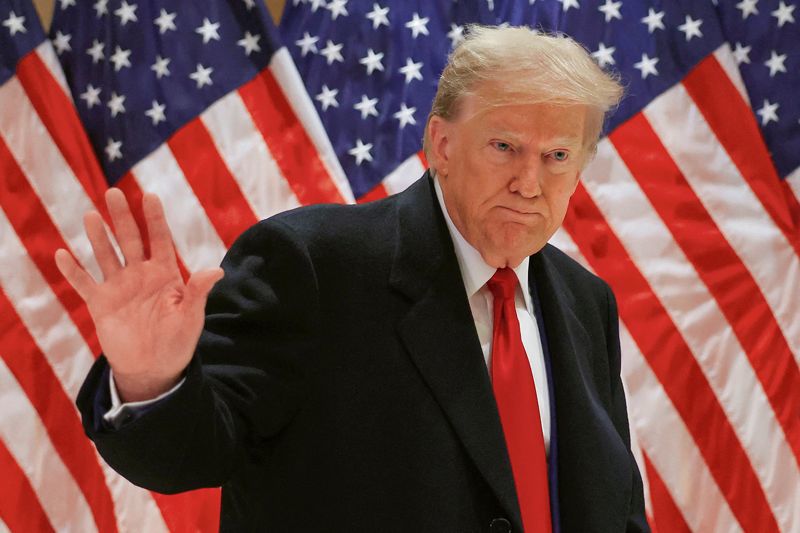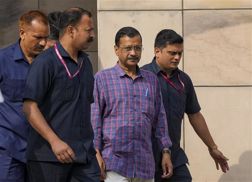
EDGE: The political landscape could change in the coming months, but at this point, Donald Trump remains ahead in the opinion polls. Reuters
Former Foreign Secretary
THE likelihood of Donald Trump being elected US President in November is increasing by the day. Despite his legal troubles, Trump’s committed vote has not been affected. If anything, he has been able to leverage the victim card skilfully to consolidate political support among the poorer, less-educated Whites, surprisingly, the Latinos and the Republican Party’s hard right wing. Joe Biden is losing support among traditional Democratic Party voters. There are questions about his age (he is 81); his support for Israel has alienated university-educated Whites and Blacks as well as the significant Arab-American and Muslim constituency. While the US economy has been doing well, with declining inflation, rising wages and low unemployment, this has not yet turned political sentiment in favour of the incumbent leadership. Disaffected Democratic Party supporters may not vote for Trump, but they may end up not voting at all rather than casting their ballot for Biden. The political landscape could change in the coming months, but at this point, Trump remains ahead in the opinion polls.
A US administration under Trump is expected to support further strengthening of relations with India.
Over the past decade, the India-US relations have expanded across the board and enjoyed bipartisan consensus in America. A US administration under Trump is expected to support further strengthening of relations. Additionally, if the Modi government retains power as expected, it is unlikely to be troubled by US criticism of alleged human rights violations and discrimination against the minorities in India. In some respects, relations between the two countries may become more transactional than they are currently, but this may be only a matter of degree. The transactional element is prominent even now.
The need to constrain China in the Indo-Pacific has been a priority for the Biden administration. But it was under the Trump administration in 2017 that the quadrilateral of India, Australia, Japan and the US was revived. During his visit to India in 2020, Trump said at a press conference with Prime Minister Modi at his side: “Together, the Prime Minister and I are revitalising the Quad initiative (involving the US, India, Australia and Japan). Since I took office, we have held the first Quad ministerial meeting and expanded cooperation on counter-terrorism, cybersecurity and maritime security and to ensure a free and open Indo-Pacific.”
One should expect the US Indo-Pacific strategy to continue and be further consolidated. There are recent reports that Trump may not be supportive of the AUKUS nuclear submarine alliance among Australia, the UK and the US mainly due to the high cost spread over a number of years. He may insist on Australia shouldering a higher proportion of the cost. This would be welcome news for the Chinese.
What will Trump’s policy be on Russia? This is important as it would also influence the Russia-China relations and collaterally, the India-Russia ties. There is a view that Trump will promote an immediate ceasefire in the Russia-Ukraine war, followed by a peace deal involving unspecified territorial compromises. The pressure on Ukraine will be put through denial of economic and military aid, while the pressure on Russia would be that in case the latter is recalcitrant, the US would resume large-scale support to Ukraine. However, Trump’s antipathy to Ukraine is well known. It is possible that he would deny support to Kyiv and allow peace on Russian terms. But it is also likely that Europe would try and fill the breach, which it is already doing currently.
Trump may open the door to a limited political détente with Russia, but the anti-Russian sentiment within the US political elite across the political spectrum runs very deep. It is unlikely that the sweeping sanctions imposed on Russia will be lifted. The large chunk of Russian foreign exchange reserves may remain frozen. The one remaining US-Russia agreement on strategic arms reduction and limitation, known as the New START, will not be renewed upon expiry in 2026. Nevertheless, even a tactical shift reducing the US confrontation with Russia will take some pressure off India, which, for political, defence and energy security considerations, needs to maintain a friendly relationship with Russia. Would this mean that China would also gain from an improved US-Russia relationship? Not necessarily, since the rivalry between the US and China is structural in character and unlikely to change in the foreseeable future. The relationship may worsen under Trump for two reasons. One is Trump’s threat to raise tariffs against Chinese imports significantly, thereby intensifying the trade war. Secondly, Trump may decide to up the ante on the Taiwan issue by re-establishing relations at senior officials’ level or significantly increasing sales of sophisticated defence equipment to Taiwan. In both cases, China will react strongly and downgrade the relationship, reversing the recent improvement under the Biden administration. India’s value to the US as a partner that helps countervail China will remain.
In the Israel-Hamas war, Trump will be more supportive of Israel than Biden has been. This will encourage Israel to continue to intensify the war in Gaza. The US will be seen as complicit. This may undermine the gains made through the conclusion of the Abraham Accords under Trump 1.0, and which normalised relations between Israel and Bahrain, Morocco, Sudan and the UAE. Like the US, India may find its current policy of courting both Israel and the Arab states more difficult to sustain.
The one major challenge India may face under Trump is on the trade front. India is likely to be at the receiving end of a slew of expected protectionist measures. Trump is likely to abandon the Indo-Pacific Economic Framework, which is led by the US and has India among its members. The ongoing efforts to achieve a grand bilateral trade and investment bargain are unlikely to be pursued under Trump. However, the expanding cooperation in sophisticated technologies and defence hardware cooperation will continue.
A second Trump term will, on balance, cause less anxiety in New Delhi than in many other capitals of the world.
Join Whatsapp Channel of The Tribune for latest updates.



























